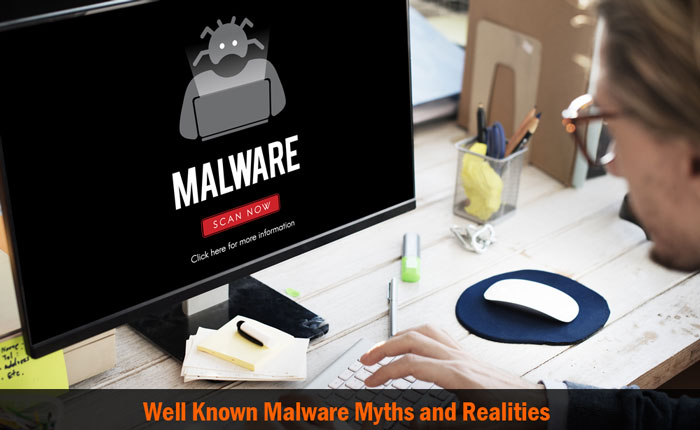The internet has grown exponentially in the last decade and with the development of semiconductor technology, owning smart devices have become increasingly affordable. An increase in subscribers has also caused greater competition among Internet service providers to offer more affordable plans. This invertedly has caused us to be incredibly dependent on the internet for important tasks such as banking or education and has also become our primary source of recreation.

This dependence on technology for important tasks has led to a gradual increase in cyber-crime. Keeping yourself safe is key, as a malware attack on your device can have severe consequences and loss of personal information can have long term effects – Decent, free antivirus software is easily available, therefore installing one on your devices vastly reduces your chances of suffering from data breaches.
In this article, we’ll try to debunk some popular myths about free antivirus software as many people consider them to be a marketing gimmick compared to their paid counterparts.
Myth – Free antivirus offers less protection:
Well, it depends on what your bar for protection is. The basic job of an antivirus software is to eliminate malware and prevent you from getting infected in the first place. If that is all you seek, free antivirus software from companies with expertise in cybersecurity such as Bitdefender will be enough for you.
Cybercriminals are always creating newer versions of malware to bypass device security and therefore cybersecurity experts at Bitdefender are constantly trying to scan and identify newer threats. All this information is ultimately stored in their malware database from which every Bitdefender product – paid or free, updates their virus signatures from.
Another extension to this myth would be that free antivirus updates its virus signatures less frequently than the paid version – which is not true. Updates can be scheduled by the user and if you are still not satisfied, you can initiate a manual update whenever you want.
Fact – Virus signatures are all updated from the same company database
Myth – Free antivirus slows down your machine:
Antivirus software does use background system resources. This is essential as the program needs to constantly need to be on standby so that it can promptly detect a potential threat. Even so, the resources utilized are barely enough to make your device feel sluggish. Free antivirus often lacks the more resource-intensive additional malware detection tools of their paid counterparts and naturally consumes even fewer resources.
Be assured that for most average users, the level of security on offer is more than adequate. Bitdefender free antivirus has an extremely minimalist yet functional UI and doesn’t bother you with ads to buy one of their paid services either.
Fact-Free antivirus does not use higher system resources.
Myth – Free antivirus is significantly deficient in features:
As discussed above, a free antivirus software has all the features needed to provide a basic yet comprehensive protection against threats. Apart from identifying and eliminating malware, additional features are also present which protect you from internet fraud.
The phishing websites mirror legitimate ones in an effort to steal your personal, sensitive information. These can range from your address and social security number to your bank or credit card details which you may invertedly enter by getting deceived. This information can end up on the dark web and be sold or passed around – making you more susceptible to further attacks.
Decent free antivirus software identifies and warns you of such websites or spam email containing links to the same and prevents this entire vicious cycle of you disclosing sensitive information to the wrong hands. Additionally, it will detect and prevent you from visiting not so credible websites. These features are crucial and prevent the most common causes of malware infection.
So, what are you missing out on?
Mostly advanced features and other utilities. Paid versions reinforce device security by introducing more intricate layers of device protection. These include:
- Anti-Tracking – While the free version warns you from disclosing personal information on suspicious websites, anti-tracking prevents all websites from collecting information about your browsing activity. It basically masks your online presence and saves you from the hassle of getting bombarded with spam. This further reduces the chance of falling prey to phishing attempts as these websites won’t have any information about your preferences so as to send you personalised scams.
- Vulnerability Detection – Checks your entire system for security vulnerabilities. This includes notifying you about newer security updates for your apps and app settings that can possibly be taken advantage of.
- VPN – Virtual Private Network isolates your digital footprint from your Internet Security Provider and prevents tracking of information and boosts your privacy, encrypts your data for added security and allows you to gain access to content not locally available.
- Password manager and secure payment gateway – Saves, suggests strong passwords and encrypts and isolates outgoing data during sensitive transactions.
- These features are not absolutely necessary for basic protection but do have their own unique advantages. Expecting them all to be part of a free package would be asking too much but do keep an eye out for Bitdefender deals if you are tempted to get a premium user experience for a reasonable fee.
Fact – All essential security features necessary to identify, eliminate and prevent malware infection are present in Free Antivirus.
With these 3 myths out of the way, we hope you are more enlightened regarding how these programs work and their effectiveness in combating malware. You can even opt for a trial version of the paid antivirus software to determine whether the additional extras make sense for you. In any case, having free protection never hurt anyone.
 Sections of this topic
Sections of this topic
















